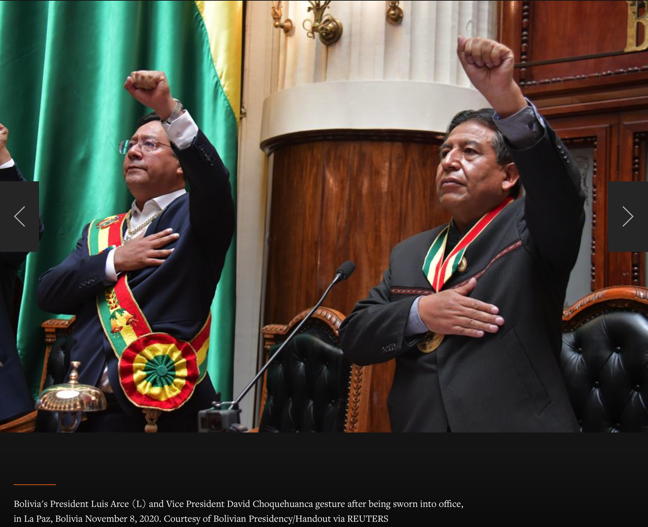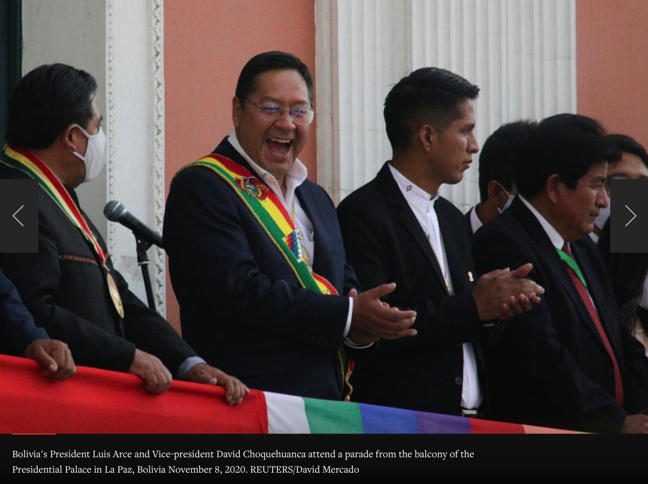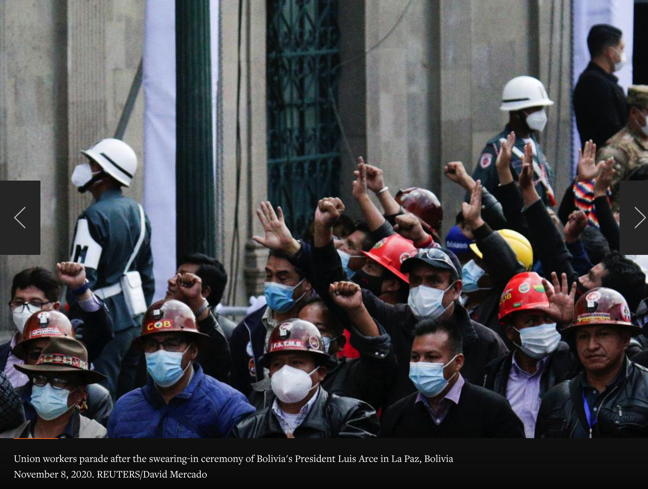
Bolivia's socialists sweep back to power as Arce sworn in as President
November 8, 2020 - Orignal article: Reuters
Daniel Ramos
LA PAZ (Reuters) - Bolivia’s Luis Arce was sworn in as president on Sunday, ushering the country’s powerful socialist party back into power a year after long-term leftist leader Evo Morales was ousted amid angry protests that sparked off a political crisis.
Arce, 57, was inaugurated in a ceremony in the highland city of La Paz, in front of heads of state from Argentina, Paraguay, Colombia and Spain, as well as senior officials from Chile, Iran and the government of Venezuela’s Nicolas Maduro.

The unassuming and bespectacled former economy minister, feted as the architect of Bolivia’s rapid growth under Morales, comes into office facing the huge task of healing the divisions of a political crisis and the coronavirus pandemic.
“We have before us the great challenge of rebuilding our economy again, of generating certainty, of generating growth,” Arce told a packed assembly of lawmakers and guests in Congress alongside his Vice President David Choquehuanca.
Arce pledged to “defeat” the pandemic in a country which has one of the worst death tolls per capita, and to heal political rifts and “put an end to fear” after deadly violence last year.

“I believe in justice, not in fostering an environment of resentment and revenge that does not respect the diversity of thought, where being from another party or political color makes you the object of hatred. That must end,” he said.
Tensions have remained high, especially over changes made by the socialist-controlled Congress to lower the majority needed to pass new laws and the planned return of Morales from exile in Argentina where he has lived since leaving Bolivia last year.
On Sunday, opposition lawmaker protested in Congress against the reduced majority, which would allow the ruling party to more easily push through new bills.
Morales, who led the country for almost 14 years as the first indigenous president, sparked a widespread backlash last year when he ran for an unprecedented fourth term in the face of term limits and a national referendum.
After claiming victory in that election, Morales was eventually forced to resign amid angry protests, and the police and military eventually dropping their support for him. He fled the country and a conservative interim government took over.
Arce, who was handpicked by Morales and is a close ally, has said that the former president will play no role in his government. Morales is expected to return to Bolivia on Monday before proceeding to his rural stronghold in Chapare.
As economy minister, Arce promoted nationalizing strategic sectors such as hydrocarbons and energy, and pushed domestic production with public investments and subsidies, which helped Bolivia grow at one of the fastest rates in Latin America.
Reporting by Daniel Ramos; Editing by Adam Jourdan, Grant McCool and Sandra Maler